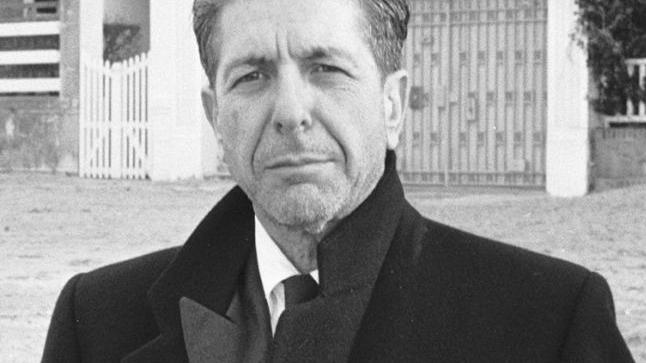The Bard

Every time a well-known western artist from behind the iron curtain came to a communist country, his or her arrival was a huge deal, its significance extending far beyond the strictly musical. Suffice it to mention the legendary Rolling Stones concert in the Warsaw Congress Hall in April 1967, Depeche Mode's appearance at Torwar in July 1985 and the monumental performance of the Queen at the People's Stadium in Budapest a year later, to name just a few of the many examples. It is against this background that I think one should view Leonard Cohen's (1934- 2016) visit of several days to communist Poland in March 1985.
The great poet, singer and writer enjoyed well-earned long-standing fame in the People's Republic of Poland. His popularity went all the way back to the ballad "Suzanne" that opened the album The songs of Leonard Cohen (1967), which Maciej Zembaty, the invaluable translator of this "world troubadour", would later gradually introduce to the Polish public. In the 1980s, it was not without significance that the Polish translation of his song "The Partisan" (by who other than Maciej Zembaty) became an unofficial anthem of the underground Solidarity movement at a time when Cohen ranked as Poland's most popular foreign artist right next to the heavy-metal band Metallica. "In Poland, we spoke Cohen, we thought Cohen, some even tried singing songs by the Canadian bard", wrote Przemysław Toboła in his review of the film Marianne & Leonard: Words of Love about the artist in a recent edition of IKS. Thus, when - at the end of the winter of 1985 - news of the Montreal musician's imminent arrival in Poland broke in music magazines and later in general media, Cohen's fans along the Vistula and Warta rivers were overcome with the kind of intense excitement they hadn't felt for a while.
Soon afterwards, people began to fight madly for tickets to one of Cohen's four concerts in Poland to be held as part of his "Various Positions" Tour promoting the artist's new album by the same title, the seventh in his career. Significantly to us, Cohen's first performance in Poland was scheduled to take place in Poznań on 19 March 1985 (at 7pm) after the artist's arrival here from Stockholm via Warsaw. For the sake of historic accuracy, I should note that the actual organisers of the event, whose central venue was the Arena hall, were the Poznań branch of Zjednoczone Przedsiębiorstwa Rozrywkowe (United Entertainment Enterprises), Zakład Widowisk Estradowych (Performing Art Company) of Warsaw and PAA Pagart. All 4,000 tickets sold out instantly. Those fans who were forced to walk away empty-handed from the box office at the intersection of ul. Głogowska and ul. Śniadeckich had only one other chance to realise their dreams: buy a ticket from scalpers at the peril of being sold a counterfeit or being charged a few if not a dozen-plus times the official rate.
On the evening of 19 March 1985, the Arena hall was bursting at the seams as the audience awaited Leonard Cohen's entrance. The artist kicked off this unforgettable meeting with the people of Poznań, the majority of whom were presumably college students, with the famous "Bird on the Wire". What followed was over three hours of music and a display of a remarkable personality that completely mesmerised the audience of several thousand. Ryszard Gloger, a music journalist and a reviewer of the Głos Wielkopolski daily, wrote on the following day, with a dash of poetic eloquence: "This master of mood-setting made perfect choices to control the concert's tempo, fervour and dynamics. The songs he sang, known intimately to the majority of audience members, blended into a continuous story told by a man who, in this frantic world of ours, is capable of bringing people's attention into sharp focus on a single gesture, a female face or a word."
What is significant is that this was the first time that the great musician, who managed his musical spectacle with absolute perfection, realised the sheer extent of his popularity in Poland. He was confronted with an audience who perfectly knew the lyrics of every song he performed. Not without reason, P. Toboła wrote years afterwards: "I saw with my own eyes the singer's astonishment at the sight of an entire house of fans singing along his famous songs including "Suzanne" and "So Long Marianne"."
The Arena concert, which ran over the scheduled time by more than an hour due to multiple encores and ovations, each lasting several minutes, did not end the artist's very long day in Poznań. As soon as the concert was over, Cohen was rushed to a Poznań studio of the Polish Radio at ul. Berwińskiego where, shortly before midnight, he took part in a one-and-a-half-hour live show which Polish Radio One broadcast nationally as part of a popular programme called "Music by Night". Despite pleas and threats from his manager, who insisted they return to the hotel immediately, Cohen took his time talking with Andrzej Marc of Pagart, Rafał Węgierkiewicz and Tadeusz Sznuk, who linked with Poznań directly from the Warsaw studio. As a consequence, Cohen did not leave the radio station until about 1am. After a brief rest in his hotel room, he set out for Wrocław, where he bravely faced the Nazi heritage of the Centennial Hall on the night of 20 March 1985 ("I know who appeared here before me but... there is a difference between me and Hitler. Hitler could not sing"). The final two concerts of the tour of Poland took place in Zabrze and Warsaw. Cohen did not revisit Poland until the new millennium. Despite a promise he made in 1985, he never made it to Poznań again.
Piotr Grzelczak
translation: Krzysztof Kotkowski
© Wydawnictwo Miejskie Posnania 2020
See more

From One Celebration to Another

Christmas Markets and Fairs with Attractions

Truly Festive Vibes
